Health Technology Assessment International Symposium
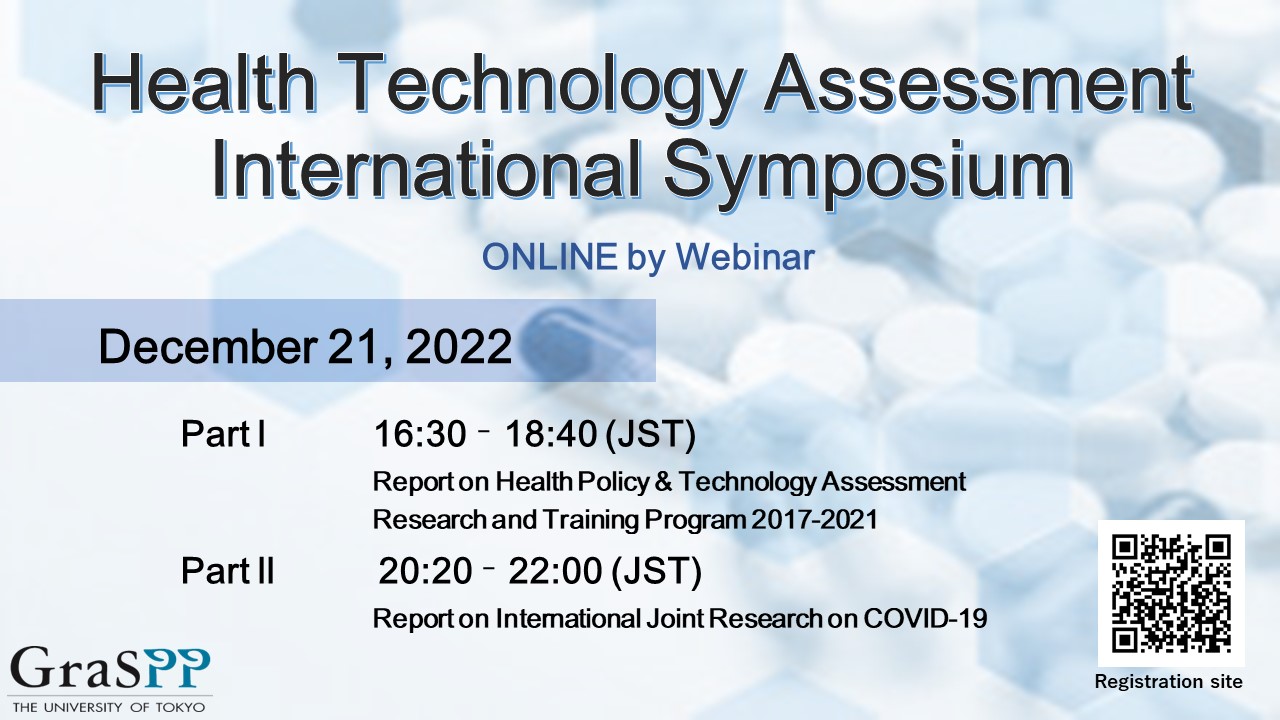
Details
| Type | Lecture |
|---|---|
| Intended for | General public / Enrolled students / Companies / University students / Academic and Administrative Staff |
| Date(s) | December 21, 2022 16:30 — 22:00 |
| Location | Online |
| Entrance Fee | No charge |
| Registration Method | Advance registration required
Please register here. |
| Registration Period | November 28, 2022 — December 21, 2022 |
GraSPP Project Report on “Health Policy & Technology Assessment Research and Training Program 2017-2021” and “International Joint Research on COVID-19”
Date & Time: December 21, 2022Part I 16:30-18:40 (JST)
Part II 20:20-22:00 (JST)
Venue: Virtual Online Meeting
Organizer: Graduate School of Public Policy (GraSPP), The University of Tokyo
Co-Sponsor: The Canon Institute for Global Studies (CIGS)
Auspice: Musashino Institute for Global Affairs, Musashino University
Program
Part I “Project Report on Health Policy & Technology Assessment Research and Training Program 2017-2021”
The research and education project on health policy and technology assessment (HPTA) was initiated in April 2017 at the Graduate School of Public Policy (GraSPP), University of Tokyo. The HPTA was designed to collaborate with the MHLW officers and the affiliated experts who have responsibility for a new policy of health technology assessment (HTA), which was provisionally introduced in 2016 and institutionalized in 2019. The first part of this symposium reports the achievement of the HPTA project reviewing the past six years from 2017 to 2022 and seeking future directions for Japan, learning global challenges from an European expert of HTA.| 16:30-16:40 | Opening Remarks Hideaki Shiroyama, Professor, Graduate School of Public Policy, The University of Tokyo |
| 16:40-16:50 | Co-Sponsor’s Remarks Toshihiko Fukui, President, The Canon Institute for Global Studies |
| 16:50-17:15 | "Report on Health Policy & Technology Assessment Research and Training Program 2017-2021" Isao Kamae, Project Professor, GraSPP, The University of Tokyo |
| 17:15-17:30 |
"Public-private partnership on HTA education in GraSPP 2017–2021"
Makoto Kobayashi Director and Chief Operating Officer, Crecon Medical Assessment, Japan
|
| 17:30-18:30 |
"Global Challenges of HTA in Comparison with Germany, France and Japan" Jörg Mahlich, Market Access & Government Affairs Lead, Miltenyi Biomedicine, and Research Affiliate, Düsseldorf Institute for Competition Economics (DICE) Germany |
| 18:30-18:40 | Dean’s Remarks Keisuke Iida, Dean, GraSPP, The University of Tokyo |
Part II “Project Report on International Joint Research on COVID-19”
The objectives of this session are to introduce the International Joint Study on Public Health Economics of the COVID-19 Pandemic with the research grant, “Hitachi Fund Support for Research Related to Infectious Diseases,” which was initiated on the platform of GraSPP, the University of Tokyo in December 2021. Three groups with international experts in health economics and outcomes research in Europe, Asia and North America will discuss the gap between myth and truth experienced during the pandemic so far, and share the lessons learned, focusing on public health economics, testing strategies, and simulation impact of vaccinations.
| 20:20-20:25 | Primary Investigator’s Remarks Akio Onishi, Visiting Professor, GraSPP, The University of Tokyo |
| 20:25-20:55 |
Asia group progress report "Evidence-based testing" Makoto Kobayashi, Director and Chief Operating Officer, Crecon Medical Assessment, Japan
Ryo Watanabe, Associate Professor, Kanagawa University of Human Services, Japan
Chee Jen Chang, Distinguished Professor, Chang Gung University, Taiwan
Hwee-Lin Wee, Associate Professor, National University of Singapore
|
| 20:55-21:25 | Europe group progress report "Public health economics" Ulf Persson, Senior adviser and Professor, Swedish Institute for Health Economics(SIHE), Sweden Pierre-Yves Geoffard, Professor, Paris School of Economics, France
Jörgen Möller, Vice President, Evidera, Sweden
|
| 21:25-21:55 | North America group progress report "Simulation and the forecast impact of vaccination" Jaime Caro, Chief Scientist, Evidera; Professor, McGill University, Canada; Professor in Practice, London School of Economics, UK Debra Schaumberg, Professor,Ophthalmology and Visual Sciences, University of Utah, USA
Jack Ishak, Vice President, Evidera, Canada
|
| 21:55-22:00 | Closing Remarks Isao Kamae, Project Professor, GraSPP, The University of Tokyo |
Speakers (In order of appearance)
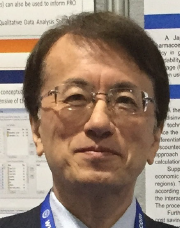
Isao Kamae
Graduated from Kyoto University, Faculty of Engineering and Graduate School of Engineering, Master of Engineering. Graduated from Kobe University, School of Medicine, MD. Harvard University, Doctor of Public Health.
The founding President of the International Society for Pharmacoeconomics and Outcomes Research (ISPOR) Japan Chapter (2005-09). The first Japanese to serve on board members of relevant international societies (Board Director; ISPOR 2004-06, HTAi 2017-20), the first Asian to serve as President-Elect of ISPOR 2020-21 and President of ISPOR 2021-22, and a pioneer in health economics research in Japan. Research Director at The Canon Institute for Global Studies.
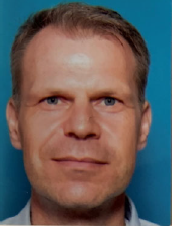
Jörg Mahlich
Jörg Mahlich graduated in economics from the University of Kiel/Germany, and holds a doctoral degree in economics from the University of Vienna/Austria. He is currently Market Access and Government Affairs Lead at Miltenyi Biomedicine. In addition, he is a Lecturer of Health Economics at the Economics Department of the University of Vienna and a research affiliate at the Düsseldorf Institute for Competition Economics (DICE) of the University of Düsseldorf, Germany. Previously, he held different positions in the health economics and market access team of Janssen in Japan and Germany, as well as consulting experience in Austria. His research focus is on pharmaceutical economics and policy, including HTA.
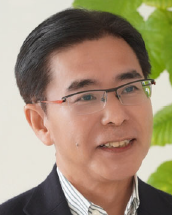
Akio Onishi
Graduated from the University of Tokyo, School of Engineering in March 1982, from Wharton School, University of Pennsylvania in May 1988.
April 1982: Ministry of International Trade and Industry, Minister's Secretariat of Machinery Information Bureau, etc.; September 1989: McKinsey & Company; February 1995: Organisation for Economic Co-operation and Development (OECD); October 2012: Deputy Director General of Medical Innovation Promotion Office, the Cabinet Secretariat;
January 2011: Professor at the University of Tokyo Public Policy Institute (Visiting Professor since 2016); April 2013: Visiting Professor, International Research Institute, Meiji University; March 2019: Professor, Health Innovation School, Kanagawa University of Human Services.

Ulf Persson
Ulf Persson, PhD, is a senior adviser at the Swedish Institute for Health Economics (IHE). IHE was established in 1979 as the first center for health economic research in Sweden. IHE has a staff of about 30 health economists.
Ulf was until end of 2017 the CEO at IHE and holds a position as adjunct professor in Health Economics at Lund University. He has also experience as former director in health economics at Johnson & Johnson in New Jersey, in the US. He has almost 40 years of research experience in the development and application of economic evaluation methods in health care. His main research areas are health economics, pharmaceutical economics, economic evaluations, and transport economics. He has published more than 300 articles, books and reports on health economics and economics of transport safety. He has 10 years of experience in price and reimbursement decisions as a former member of the Swedish Dental Benefit Board and the Swedish Pharmaceutical Pricing and Reimbursement Board, both included in the Dental and Pharmaceutical Benefits Agency (TLV).
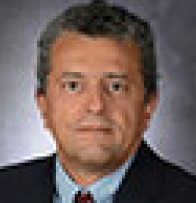
J. Jaime Caro
J. Jaime Caro, MDCM, FRCPC, FACP, Professor in practice, LSE; Professor of Medicine, Epidemiology, Biostatistics (adj), McGill University; Honorary Visiting Associate Professor with the Saw Swee Hock School of Public Health, National University of Singapore; Chief Scientist, Evidera. For Germany’s IQWiG, Dr. Caro proposed an innovative approach to health technology assessment, involving efficiency frontiers. His recent work involves leveraging hybrid growth/decay functions to forecast highly local COVID-19 trajectories; development of DICE 2.0, a unified approach to modeling that enables rapid, standardized and less error-prone forecasting models; a broader approach than QALYs to value health benefits, the BADIE. He led ISPOR-SMDM’s task forces for Good Modeling Practices and Modeling Quality Assurance, and chairs ISPOR’s Science and Research Committee.






